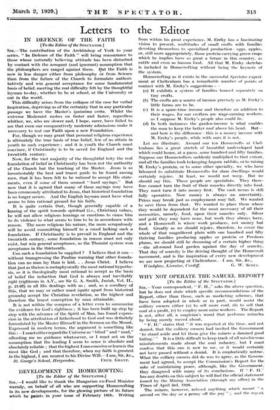DEVELOPMENT IN HOMECROFTING
[To the Editor of the SPECTATOR]
SIR, —I would like to thank the Hungarian ex-Food Minister warmly, on behalf of all who are supporting Homecrofting in its new developments, for the glowing picture of its future which he paints in your issue of February 16th. Writing from within his great experience, M. Ereky has a fascinating vision to present, multitudes of small crofts with families devoting themselves to specialized production—eggs, apples, or, still more appropriately, those protein-carrying green crops which he implies have so great a future • in this country, as cattle and even as human food. All that M. Ereky sketches is included in Homecrofting without being the keynote of the system.
Homecrofting as it exists in the successful Spectator experi- ment at Cheltenham has a remarkable number of points of contact with M. Ereky's suggestions :— • (a)- It exhibits a system of families housed separately on tiny crofts.
(b) The crofts are a source of income precisely as M. Ereky's little farms are to be.
It is a spare-time income and therefore an addition to their wages, for our crofters are wage-earning workers, as I suppose M. Ereky's people also could be.
In both instances the garden-income is what enables the man to keep the better roof above his head. But— and here is the difference —this is a money income with M. Ereky's people, while with ours it is not.
Let me illustrate. Around our ten Horaecrofts at Chel- tenham lies a great stretch of beautiful undeveloped land which could house, at a guess, some hundred and fifty families. Suppose our Homecrofters suddenly multiplied to that extent, and all the families took to keeping Angora rabbits, or to raising
M. Ereky's protein, or to• some other specialty, we who have laboured to substitute Homecrofts for slum dwellings would certainly rejoice. At least, we would not weep. But we should say this. Those people arc specialists. They there- fore cannot turn the fruit of their muscles directly into food. They must turn it into money first. The cash nexus is still fully operative. Now money is always an uncertainty. Prices may break just as employment may fail. We wanted to save them from that. We wanted to place them where they would be dependent for the most necessary of all their necessities; namely, food, upon their muscles only. Silver and- gold they may have none, but work they always have, and a Homecroft is where' work produces, not money but food. Greatly as we should rejoice, therefore, to cover the whole of that magnificent plain- with one hundred and fifty thriving families producing apples or protein or Pershorc plums, we should still be dreaming of a certain higher thing —the all-round "food garden against the day of scarcity. That day of scarcity is the driving thought of the Homecroft movement, and is the inspiration of every new development we are now projecting at Cheltenham.—I am, Sir, &e.,
Windylaw, Lisraine, Cardiff. G. W. Scam
























































 Previous page
Previous page